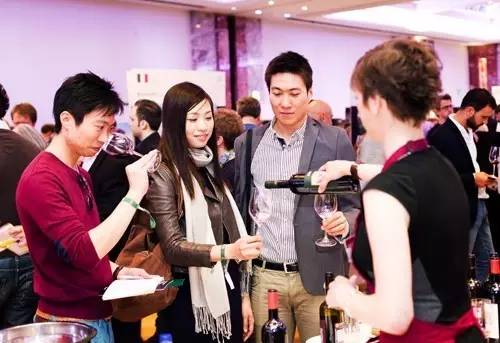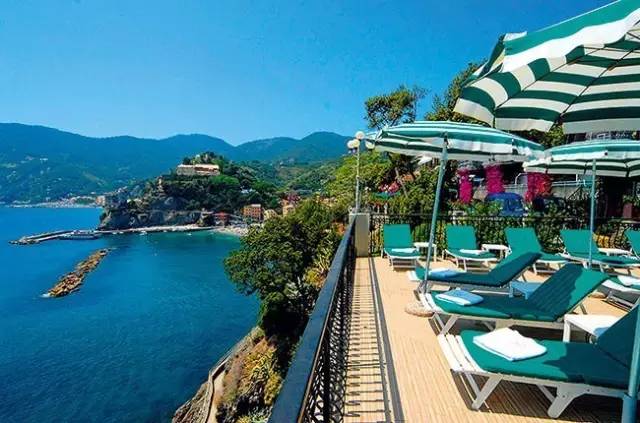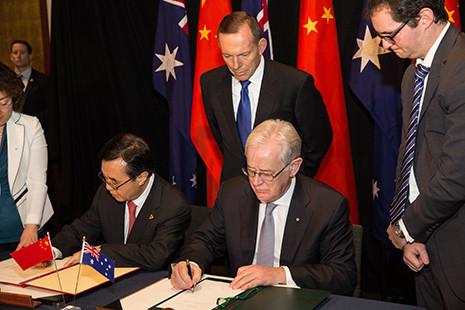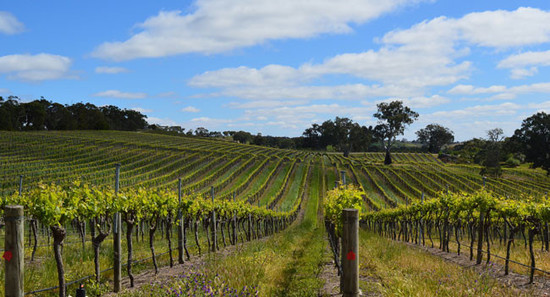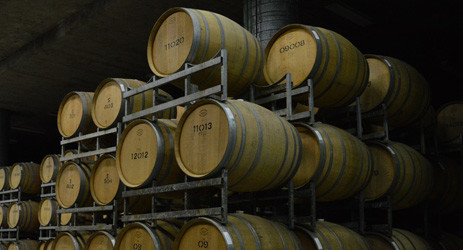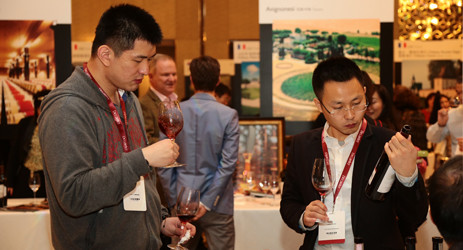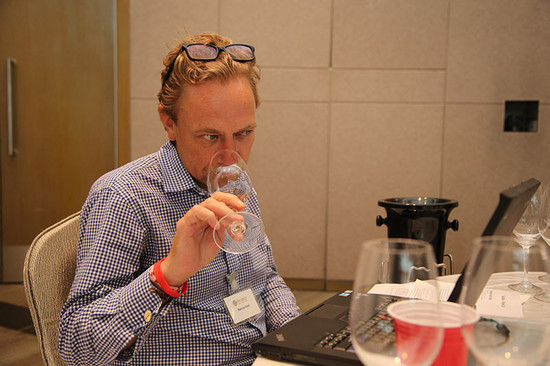他是法国勃艮第最大酒商,也是法国排名第三的葡萄酒酒业巨头,在美国加州他也有颇具规模的葡萄酒产业,事业领域甚至触及家居、时尚、艺术等。他太太是美国最大葡萄酒生产商之一Gallo的家族成员,他产业的扩张速度颇为惊人,是国际葡萄酒行业中极富个性的明星。他就是Jean Charles Boisset先生。
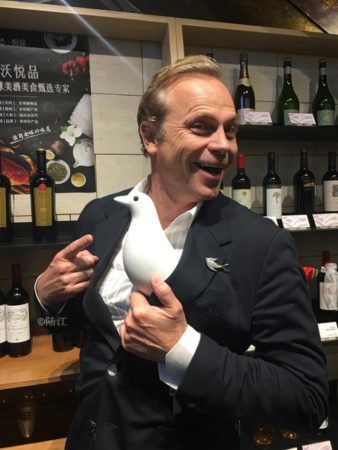
我其实关注他产业已有数年,一直想有机会和他交流。正好最近Jean Charles Boisset先生到北京,和联想佳沃葡萄酒签约合作。联想佳沃葡萄酒正式成为Jean Charles Boisset先生旗下纳帕名庄Raymond Vineyards的在华代理。
我按着约好专访的时间,到了现场,正好在播放Jean Charles Boisset先生旗下酒庄的宣传片,节奏是007风格的,穿插了点小剧情,关键主演居然是他本人,搞怪也是他的特质。这个推广形式倒是蛮有新意。

现实版的Jean Charles Boisset先生,很外向,很愿意表达,聊着聊着容易主题扩散跳跃,所以要及时把话题拽回来。总的来说采访Jean Charles Boisset先生,是很轻松有趣的,而且绝大多数话题,他都会坦诚表达,很少打太极,当然他也会撒鸡汤,不过干货很多。
陆江:您是国际葡萄酒产业的大明星,我很好奇您的成长经历,能否简单分享一下?
Jean Charles Boisset(后面缩写为JC Boisset): 我觉得我应该是个生于紫禁城的中国皇室后裔啊。。。开玩笑的!我父母是土生土长的勃艮第武玖(Vougeot)村人,后来在那里开始了他们的酿酒生涯。1969年我出生,也算有缘,出生地正好在酒窖的楼上,可以算是闻着葡萄发酵的味道而生。
我家离Clos de Vougeot特级园很近,葡萄园是我的游乐园,自然的力量和神秘让我着迷。顺便提一下,我喜欢中国的阴阳之道,可以说我从小的成长经历让我对它产生很大兴趣,我热爱中国文化。我的祖父母都是学校教师,从小教育我自然界的一些规律和农历知识,这些和中国的农耕理论也是相通。同时也和现在我们采用的生物动力理论也是一致的,我们注重的是预防,而不是治疗,所以我是生物动力理论的超级粉丝,我认为这是葡萄酒的未来。
陆江:那您学的专业是什么?
我在法国、英国和美国求学,专业是经济和金融。我没有选择和酒相关的专业,因为觉得没有必要。毕竟我四岁就开始参与酿酒了,泡在酒窖里得来的经验比书本上那些管用。当然我深爱葡萄酒,葡萄酒让我延伸涉足到经济、艺术、室内设计、平面设计等领域,给了我很多启发和创新灵感,可以肯定地说,葡萄酒是我命中注定的行业。
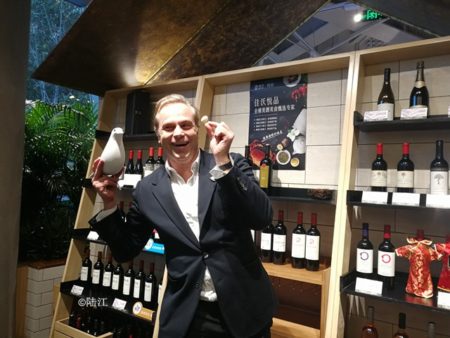
陆江:你是一直为自己家族酒庄工作吗?有在其他的酒庄工作过么?
我大学毕业时在银行实习过,太无聊,然后我就回归家族,与家人一起工作,在法国和美国建立了自己的酒庄。我知道自己想要什么,也知道如何去实现。
陆江:您身上能看到不同文化的影子,对您来说您自己更像是美国人,还是更像勃艮第人?
JC Boisset:我都有一点吧,我是勃艮第人,很传统,注重历史和传承,不过我也是美国人,非常在意创造力、主动性,想要与众不同。在我看来,理解过去,是为了更好的创造未来,最重要的是多想想还有什么事情没做,以及如何能用另一种方式去做。
所以其实我是世界人,我爱中国,也爱日本、非洲、美国、加拿大。。。爱这个世界。更准确的说法或许是,我是地球村的村民。当你能够兼容并蓄不同文化,你才能感知他人的想法和感受并与之共情。
陆江:所以您是精神层面上非常丰富的人,我记得您还特别喜欢鼓励同事们要有梦想,所以“梦想”这个词在您公司出现频率很高吧?
JC Boisset:是的,您说的非常对,我一直努力的鼓励旁人去发挥想象力,营造一个美丽的梦境。人生不该只有一种颜色,应该是五彩缤纷的,有多种被解读的角度和被展开的方式。我想带领人们进入一段旅程,在那里你会遇到你不了解的你自己。
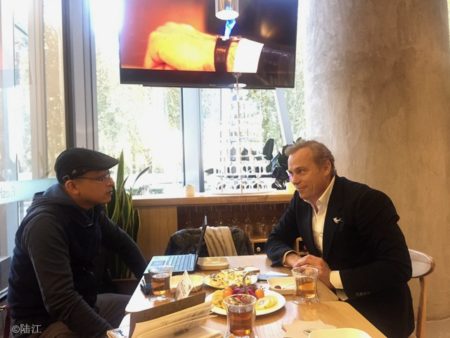
陆江:那么未来您也会涉足葡萄酒以外的其他行业么?
JC Boisset:我们已经葡萄酒以外的业务,像珠宝、酒具、蜡烛,明年还会发布一款香水,是由葡萄提炼出的精油作成的。葡萄酒是一个注重感官体验的产品,那么所有感官体验的产品其实都与之有相关性。另外,收购别人现成的产业是个选择,不过那就不能体验到把它创造出来的快感了。不停的构建新的设想,然后把设想付诸现实,是我最喜欢的事。
陆江:最近勃艮第莫墨森(Mommessin)家族把特级独占园Clos de Tart卖给了Francois Pinault,而您之前收购Mommessin家族的酒商业务时,没考虑过收购Clos de Tart?
注:Francois Pinault是法国开云集团的主席,拥有Gucci、以及拉图,Chateau Grillet、Domaine d’Eugenie、Araujo Estate等顶级庄.
JC Boisset:当时Clos de Tart还是为莫墨森(Mommessin)家族30个左右的家庭成员所共有,他们不太想卖。这次终于他们决定卖掉了,不过出价很疯狂。
陆江:2015年Skalli把纳帕名庄St Supéry卖给了香奈儿(Chanel),你错过了这家名庄也是同样原因?
JC Boisset:是的,2011年我买下Skalli在法国境内的产业,是他们产业的大部分,全加起来差不多有2000公顷。当时也想顺手买下他们在美国的St Supéry,但是他们不想卖,想自己留着,结果后来2015年卖给香奈儿了。
陆江:在过去的20年里,您买了不少酒庄,未来也会继续买下去么?您选酒庄有什么标准吗?
JC Boisset:我喜欢那些有丰富历史的老酒庄,比如Buena Vista,比如纳帕老酒庄Raymond(联想佳沃代理),索诺玛俄罗斯河谷的老酒庄De Loach,勃艮第老酒庄Bouchard Aine&Fils 等。我们会选择那些历史悠久,曾有过用心经营的家族,并且拥有品质出色葡萄园的酒庄。葡萄园太重要了,因此我们也只选择那些出最好葡萄园的地方,隆河谷、伯恩丘、夜丘、夏布利、纳帕等,我刚刚还在St Helena买了一片葡萄园。
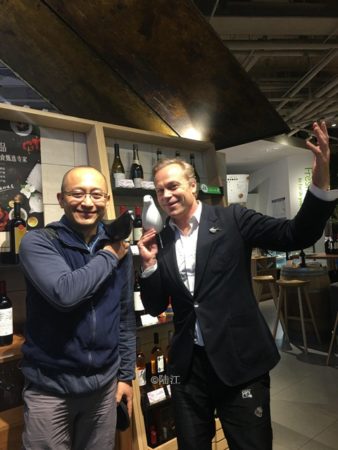
陆江:您还会一直收购酒庄吗?
JC Boisset:我还会继续收购酒庄。另一方面,我反复说过一个词:创造(Create)。二十年前,我和我姐姐一起创造了Domaine de la Vougeraie酒庄。要知道你并不是凭空把它造出来,这个创造出来的新酒庄是对它的历史和文化的一种反射。我还有其他的想法,比如会设计杯子、醒酒器,明年你们会看到我设计的两款水晶酒杯上市。除此之外还有酒瓶啊、包装啊,都是我们自己的设计,这些都体现了“创造”这个要点。
酿酒也是如此,我在酿酒的时候,想的不仅仅是风土,还想象着自己喝酒的瞬间,想着自己希望人们怎样去喝这些酒,会有什么样的感觉,这些决定了我酿酒的方式。我决定了这款酒的风格,从这点上来说,我跟设计师是一样的。比如Bouchard Aine&Fils,有力量但不是一款庞大的酒,是很细致的风格。联想佳沃代理的Raymond,精巧纤细风格,是纳帕谷最精致的酒庄之一。每一个酒庄都有自己的风格。
陆江:现在您住在美国还是法国呢?
JC Boisset:来回跑吧。我妻子虽然是以美国为主,但是每年也会在法国呆上1/4的时间。事实上我有大把的时间花在路上,我一年大概有40%的时间是在全球四处跑。
陆江:您的事业发展那么迅速,包括大量收购,你的财力来源呢?
JC Boisset:别忘了我的专业就是学经济金融,自己家族财力肯定不够,我们和银行二十多年来一直就葡萄园项目有合作,我们比较成功,信誉良好,银行是欢迎我们的。
未完待续,下一篇:《勃艮第最大酒商采访录(下)》
